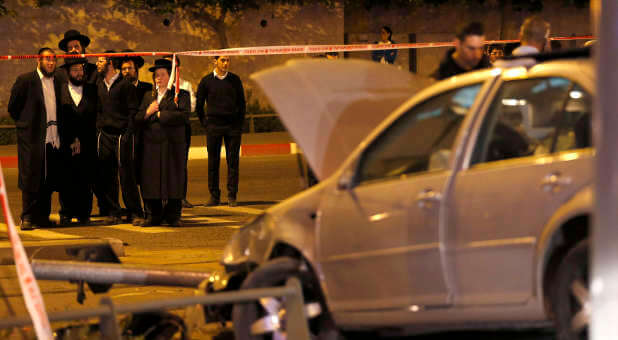We say of every terror victim that they died before their time. Picked before they ripened.
Age does not matter. But the image of the man carrying Chaya Zissel Braun in his arms (Is it her father? It’s heartbreaking), rushing her to the mobile intensive care unit as she lay in her pink clothes, barely as big as his forearm—it ties your stomach in knots. At only three months old, this is what happened to her, and there is simply no way to ease the pain.
Every soul taken leaves behind a hollow space. We not only mourn those taken, but also those who never had the chance to live.
And when a newborn is murdered—that is a whole life gone to heaven. Along with her went her life, all the children she may have had, all the words she never spoke. A well of missed opportunities, her whole life ahead of her. Just a tiny bud, a seed only just planted—and already cut.
And the one who cut off her young life also took away many beautiful years of her parents’ lives—the years during which they waited for her, they invested heart and soul hoping to one day hold their own baby. They went through difficult fertility treatments, they prayed, they wished.
Until one day, it happened—”like a line etched on the palm of a hand,” and they opened their arms to receive this great gift. A soul. Her mother hugged her, breathed in the sweet scent of her newborn skin and whispered in her little ear that she would do anything and everything for her. Her father cradled her gently. And both of them were thrilled by her tiny toes and her first smile.
Haim Nahman Bialik wrote, “One the Slaughter” (“Revenge for the blood of a little child has not yet been devised by Satan”) about the Kishinev pogrom. The poem’s title is taken from the blessing made over the kosher slaughter of an animal, but here, it is people being slaughtered. And the earth is already swollen with the blood of children.
It is possible that little Chaya was laying in her stroller. Or that her mother was holding her in her arms. Protective arms, arms that shield from stones, from a knife, from nails. But they did not stand a chance against the car speeding cruelly into the group of people waiting at the light rail station.
Her parents saw it before their eyes, and their outstretched arms could not reach far enough to stop her little body as it was flung 10 meters forward. Against her will, she joined the rows of tiny graves. Shalhevet Pass and Yehuda Shoham, Hadas Fogel and Shaked Avraham, Yonatan Palmer and Shmuel Zargari, and a long list of Jewish babies who could not yet put two words together, whose only sin was living.
Emily Amrousi is a member of the Yesha Council. For the original article, visit israelhayom.com.











































